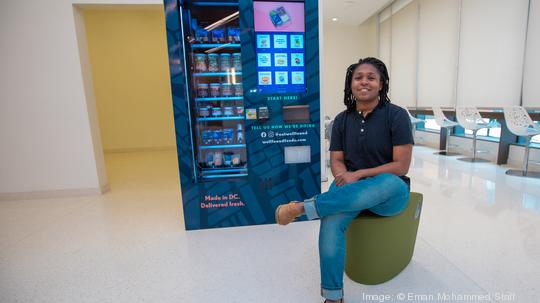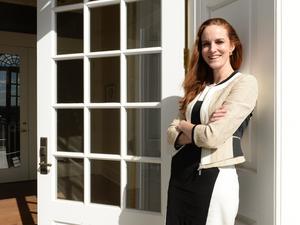
Sarah Frimpong and Brian Becker ended a July investor meeting sans financial backing, but armed with some sage feedback: “You’re really building a tech company.”
Frimpong, founder and CEO of D.C.’s Wellfound Foods, and Becker, its chief operating officer, hung up the phone, looked at each other and realized they had to change their pitch. Neither was a tech expert, and they needed tech expertise for their company — which prepares and distributes fresh food through its cloud-connected vending machines.
“That was percolating in the back of our minds as we continued to raise money,” Becker said.
It worked. The District entrepreneurs raised $1.4 million in an oversubscribed funding round led by angel investor Khushali Shah. The Steed Family Office, led by Paladin Capital Group founder Michael Steed, and early-stage investor network Citrine Angels participated in the raise.
D.C. accelerator MassLight Inc. — a software company that builds apps for startups in exchange for equity — also invested $200,000. And the company’s involvement helps fill the hole that investor spotted six months prior, Frimpong said.
Executing the game plan
Here’s the plan: Finance additional machines and get them out into the field fast. Wellfound’s fleet of tech-enabled kiosks, called SmartMarkets, now comprises 22 machines. But it’s a sliver of the 100 machines the company plans to add this year — to stock more health care facilities, government buildings, universities and transportation hubs, from train stations to airports, Frimpong said. Existing customers include the White House and U.S. Capitol, Children’s National Hospital and Inova Health System, Georgetown University and George Mason University.
The fresh funding, which comes on top of a previous $820,000 raised, gives Wellfound the cash needed to build an order management platform — a feature that will indicate which fridges need products at any given time. It will also finance the buildout of a mobile app so a customer can order food — guaranteeing its availability — before visiting a machine. That’s where MassLight comes in, Frimpong said. The first version of the app is slated to launch by the end of the first quarter.
The 14-person company will need more manpower to handle that growth, Frimpong said. She’s shooting to end 2022 with 40 to 50 people across all departments, from culinary production to field service. Wellfound will also need more funding to support the expansion; the team intends to raise a Series A round by year’s end. The business projects it will grow revenue in 2022 by five times that of 2021, Frimpong said, declining to disclose specifics.
Bottlenecks and silver linings
Wellfound is now in discussions with Capital Area Food Bank and applying for grants to expand its network to underserved areas including the District’s wards 7 and 8.
But “the biggest bottleneck” is getting the physical machines, as those slated to arrive in August 2021 are now on track to reach Wellfound’s Northeast D.C. warehouse this month — thanks to supply-chain snags Becker likens to “a game of ‘Red Light, Green Light.’”
“It’s hard to say, ‘We want to provide this service across your network, but we don’t have any machines,’” he said.
Wellfound had planned to get 50 machines in the field during 2021, Frimpong said. But the delay hasn’t derailed that vision.
“Yes, the supply chain slowed us down from being able to place machines last year,” she said, “but it did give us time to look at our operations, to think about the future and lay a lot of the groundwork so that when the machines come — in seven to 10 days — we are hitting the ground running.”
Wellfound has evolved since its 2013 founding, most recently with a pandemic pivot to the current “smart fridge” model that now represents about 80% of its business, Frimpong said. Pre-pandemic, nearly all of its revenue came from wholesale orders. But in April 2020, Becker said, “we had to go pretty quickly from licking-our-wounds mode to ‘We actually have something with legs, lets pour all of our time and energy into building it out.’”




